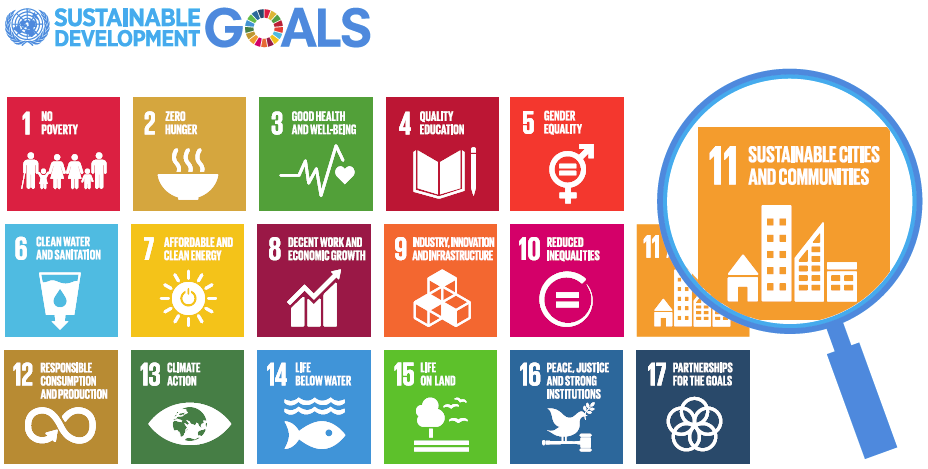Sustainable Development Goals
The 2030 Agenda for Sustainable Development is a plan of action for people, planet and prosperity. All countries and stakeholders, acting in collaborative partnership, are starting to implement this plan. The 17 Sustainable Development Goals and 169 targets, which are integrated and indivisible, demonstrate the scale and ambition of this new universal Agenda, which balance the three dimensions of sustainable development: economic, social and environmental.

Goal 11: “Make cities and human settlements inclusive, safe, resilient and sustainable”
The 2030 Agenda for Sustainable Development gives a prominent role to urbanization and cities with the inclusion of a stand-alone goal for cities and human settlements. This comes as recognition that cities are a string that connects all other goals together; their density and economies of agglomeration link economy, energy, environment, science, technology and social and economic outputs.
These interactions are important to formulate integrated policies that enhance the transformative role of urbanization and contribute to achieve sustainable development. UN-Habitat has been designated as custodian agency in 8 indicators and as a supporting agency in another 5 for Goal 11 indicators. The Agency was also designated as custodian agency for indicator 1.4.2 on security of tenure along with the World Bank for Goal 1.
Goal 11 targets:
- By 2030, ensure access for all to adequate, safe and affordable housing and basic services and upgrade slums
- By 2030, provide access to safe, affordable, accessible and sustainable transport systems for all, improving road safety, notably by expanding public transport, with special attention to the needs of those in vulnerable situations, women, children, persons with disabilities and older persons
- By 2030, enhance inclusive and sustainable urbanization and capacity for participatory, integrated and sustainable human settlement planning and management in all countries
- Strengthen efforts to protect and safeguard the world’s cultural and natural heritage
- By 2030, significantly reduce the number of deaths and the number of people affected and substantially decrease the direct economic losses relative to global gross domestic product caused by disasters, including water-related disasters, with a focus on protecting the poor and people in vulnerable situations
- By 2030, reduce the adverse per capita environmental impact of cities, including by paying special attention to air quality and municipal and other waste management
- By 2030, provide universal access to safe, inclusive and accessible, green and public spaces, in particular for women and children, older persons and persons with disabilities
- Support positive economic, social and environmental links between urban, peri-urban and rural areas by strengthening national and regional development planning
- By 2020, substantially increase the number of cities and human settlements adopting and implementing integrated policies and plans towards inclusion, resource efficiency, mitigation and adaptation to climate change, resilience to disasters, and develop and implement, in line with the Sendai Framework for Disaster Risk Reduction 2015-2030, holistic disaster risk management at all levels
- Support least developed countries, including through financial and technical assistance, in building sustainable and resilient buildings utilizing local materials
UN-Habitat role in the SDGs process
UN-Habitat is providing support to local and national governments to reflect the new global agenda in city and country development plans and policies, making the UN-Habitat’s policy expertise on sustainable urban development available to governments at all stages of implementation, monitoring and reporting.
More information on SDGs and UN-Habitat:
http://unhabitat.org/un-habitat-for-the-sustainable-development-goals/
